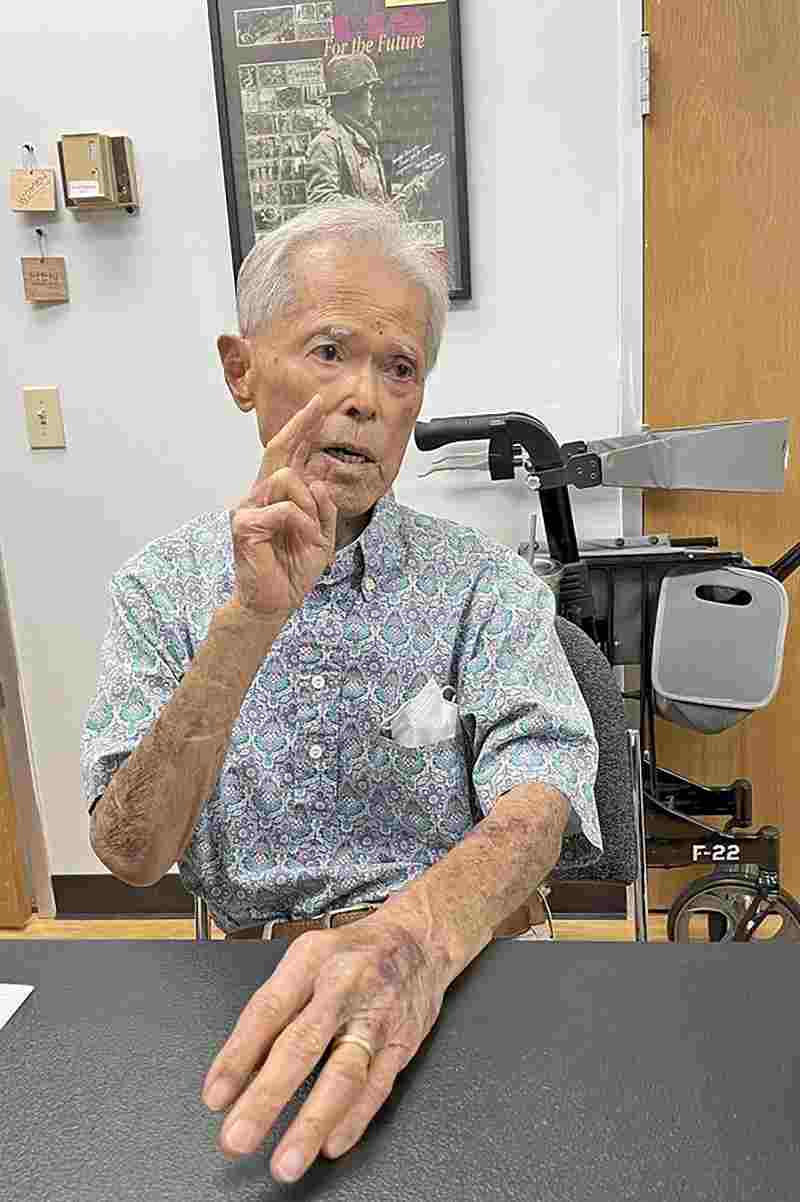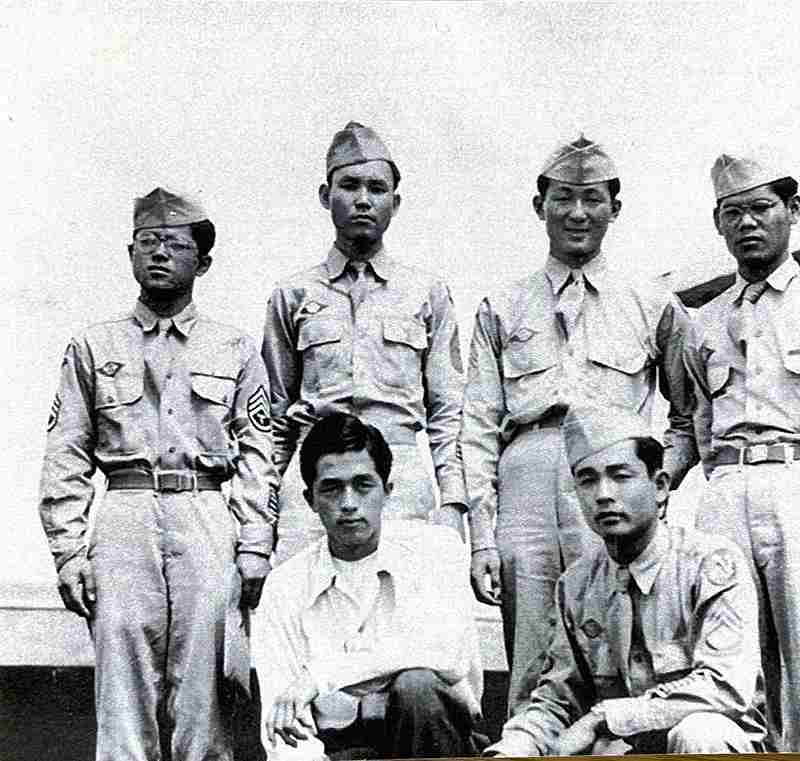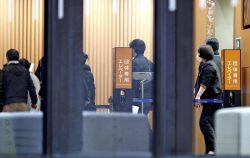
Shinye Gima, a second-generation Japanese American, speaks to The Yomiuri Shimbun in Honolulu on Friday.
December 6, 2021
HONOLULU — Japan’s attack on Pearl Harbor 80 years ago on Dec. 7, 1941, made life difficult for Japanese Americans in Hawaii as well as on the U.S. mainland.
Even second-generation Japanese Americans like Shinye Gima, now 96, were subjected to discrimination.
He had to prove his loyalty to the United States by joining the U.S. military and serving in the Battle of Okinawa in 1945. Okinawa was where his parents had come from.
During an interview conducted Friday, he looked back on that time when he felt disappointed, wondering why he and other Japanese Americans had to go through hardships even though they are U.S. citizens.
Enlisting in U.S. Army
Gima lived on the island of Maui with his family as the second eldest son among 10 siblings. Though it was eight decades ago, his memory of the attack on Pearl Harbor has never faded.
He was at his high school with other students cheering on their football team. It was then that he heard the news on the radio of the Imperial Japanese military’s surprise attack on the U.S. Pacific Fleet anchored at Pearl Harbor on the island of Oahu.
He remembered that he was suddenly at a loss, wondering what would happen from now because Japan was the home country of his parents, who had moved from Okinawa to Hawaii.
The football game was canceled. When he returned home, his parents were not talking much.
It must have been a shock to his parents that Japan had come to attack Hawaii. To his eyes, it looked as if they were worried about the negative impact on their children.
In fact, the way many people looked at and treated Japanese Americans changed, he said. They were called “Japs” or “traitors” behind their backs.
On the U.S. mainland, mainly on the West Coast, Japanese Americans were considered “enemy aliens” and sent to internment camps.
In Hawaii, religious leaders, teachers and other leaders of the Japanese American community were also held in camps.
Being subjected to discrimination, Gima felt he had no choice but to enlist in the U.S. military and fight in the war.
At first, Gima wanted to join the 442nd Regimental Combat Team of the U.S. Army, which consisted mainly of second-generation Japanese Americans and had served on the European front. However, his eyesight proved to not be good enough.
He was instead chosen to be part of the U.S. Army’s Military Intelligence Service because of his Japanese language skills, which he had developed since childhood. He ended up serving in the Battle of Okinawa as a linguist.
His parents did not say yes or no to his enlisting in the U.S. Army. Gima guessed that they understood his position; a second-generation Japanese American had to fight for the United States, unlike the first generation.

Shinye Gima, left in the back row, is pictured on the island of Oahu, Hawaii, with fellow second-generation Japanese Americans at the time of his discharge from the U.S. military in 1946.
Brother fought for Japan
After about a year of training in Japanese language and combat, Gima was sent to his parents’ homeland as a linguist in April 1945.
While feeling deeply moved to see the place of his roots, he was also troubled by the devastation and loss of so many lives in Okinawa.
Okinawa was the scene of ground battles in the closing stages of World War II. U.S. forces landed on the Kerama Islands on March 26, 1945, and on the main island of Okinawa on April 1, 1945. Many residents were caught up in the fighting.
The important mission of linguists was to implore the Imperial Japanese Army members and residents of Okinawa who were holed up in caves to surrender, rather than to resort to committing mass suicide. On Kumejima island, he prepared propaganda leaflets calling for surrender.
In Okinawa, he had a personal mission to accomplish. He had to find a brother two years younger than him. The younger brother had moved to Okinawa at age 5 and lived with their grandparents. After the war broke out between Japan and the United States, they lost contact with each other and there was no news of him.
As the fighting calmed down, Gima visited various prisoner of war camps in Okinawa to look through the prisoner rolls. At the last camp he visited, he finally found the name Noboru Gima and his brother’s photo.
Gima said he has never forgotten how happy he was to find his brother was still alive.
He later learned that his brother had been mobilized as a school-age boy soldier of the Japanese military. Soon after the start of the Battle of Okinawa, his brother was captured by the U.S. military and sent to a camp in Hawaii. Holding U.S. citizenship, his brother was detained for about a year and released in 1946.
Gima and his brother could finally reunite in Hawaii.
This year marks the 80th anniversary of the attack on Pearl Harbor. Although Japan and the United States have forged a strong alliance since the end of World War II, it is heartbreaking to see that conflicts around the world have not abated.
The war between Japan and the United States should never have happened, but it did, Gima said, adding that it led to the invasion of Okinawa, the atomic bombings of Hiroshima and Nagasaki, and the loss of many civilian lives.
Gima said that people must not forget that it is civilians who suffer the most from war and conflict.

Shinye Gima, left in the back row, is pictured on the island of Oahu, Hawaii, with fellow second-generation Japanese Americans at the time of his discharge from the U.S. military in 1946.
Top Articles in Society
-

Man Infected with Measles Reportedly Dined at Restaurant in Tokyo Station
-

Man Infected with Measles May Have Come in Contact with Many People in Tokyo, Went to Store, Restaurant Around When Symptoms Emerged
-

Woman with Measles Visited Hospital in Tokyo Multiple Times Before Being Diagnosed with Disease
-

Australian Woman Dies After Mishap on Ski Lift in Nagano Prefecture
-

Foreign Snowboarder in Serious Condition After Hanging in Midair from Chairlift in Nagano Prefecture
JN ACCESS RANKING
-

Japan PM Takaichi’s Cabinet Resigns en Masse
-

Japan Institute to Use Domestic Commercial Optical Lattice Clock to Set Japan Standard Time
-

Israeli Ambassador to Japan Speaks about Japan’s Role in the Reconstruction of Gaza
-

Man Infected with Measles Reportedly Dined at Restaurant in Tokyo Station
-

Videos Plagiarized, Reposted with False Subtitles Claiming ‘Ryukyu Belongs to China’; Anti-China False Information Also Posted in Japan




















